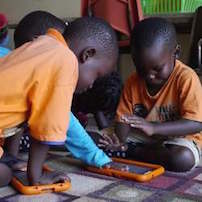 A new study by Curious Learning: A Global Literacy Project, founded by scholars at the Massachusetts Institute of Technology, Tufts University, and Georgia State University, finds that tablet computers loaded with literary applications and issued to students in low-income areas can produce dramatic results in improving literary and scores on standardized tests of reading proficiency.
A new study by Curious Learning: A Global Literacy Project, founded by scholars at the Massachusetts Institute of Technology, Tufts University, and Georgia State University, finds that tablet computers loaded with literary applications and issued to students in low-income areas can produce dramatic results in improving literary and scores on standardized tests of reading proficiency.
Researchers issued tablet computers to children in two remote villages in Ethiopia, a suburban school in South Africa with a high student-to-teacher ratio, and to students in a rural U.S. school in a district with a predominantly low-income population. No instruction was given and students had to figure out how to use the applications themselves. In all three cases, students showed significant progress in relations to peers that did not receive the tablet computers.
Cynthia Breazeal, an associate professor of media arts and sciences at MIT and the lead author on the study, states that “the whole premise of our project is to harness the best science and innovation to bring education to the world’s most underresourced children. There’s a lot of innovation happening if you happen to be reasonably affluent — meaning you have regular access to an Internet-connected computer or mobile device. There’s a lot of innovation happening if you’re around eight years old and can type and move a mouse around. But there’s relatively little innovation happening with the early-childhood-learning age group, and there’s a ton of science saying that that’s where you get tremendous bang for your buck. You’ve got to intervene as early as possible.”










